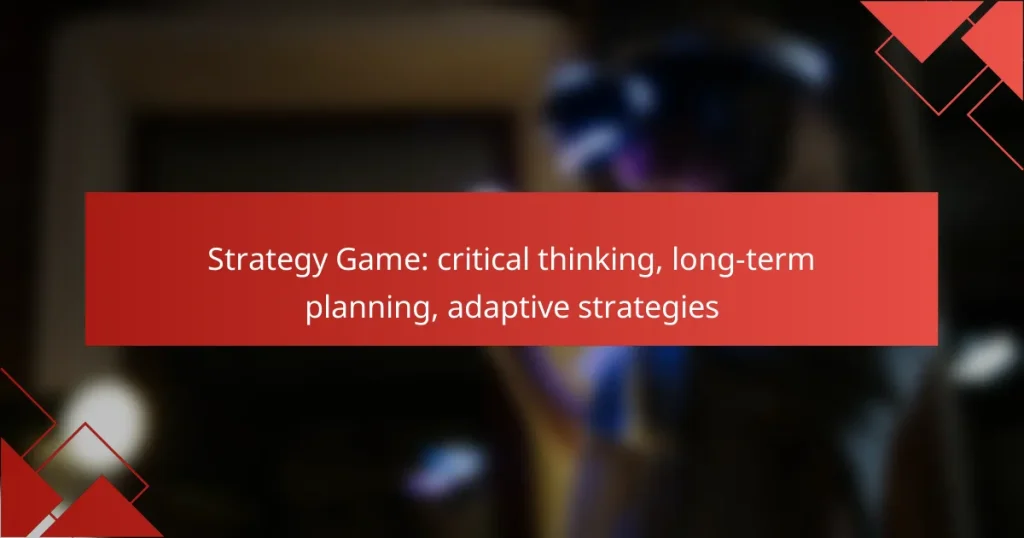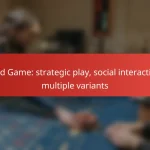Strategy games are an excellent way to develop critical thinking and long-term planning skills, as they challenge players to analyze complex situations and anticipate their opponents’ moves. By engaging in these games, players learn to devise adaptive strategies that not only enhance their cognitive abilities but also prepare them for real-life decision-making scenarios.
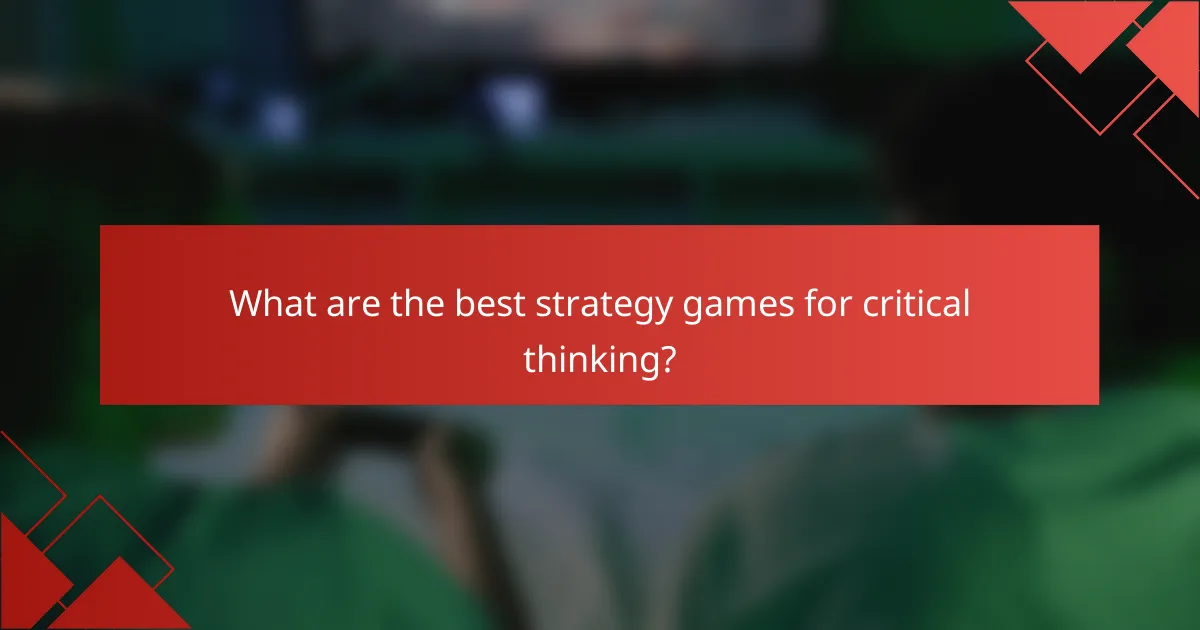
What are the best strategy games for critical thinking?
The best strategy games for critical thinking require players to analyze situations, anticipate opponents’ moves, and plan several steps ahead. These games enhance cognitive skills through complex decision-making and adaptive strategies.
Chess
Chess is a classic strategy game that emphasizes critical thinking and foresight. Players must consider various potential moves and their consequences, often planning several steps ahead. The game’s complexity arises from the vast number of possible positions, making it essential to adapt strategies based on the opponent’s actions.
To excel in chess, focus on controlling the center of the board, developing your pieces efficiently, and protecting your king. Avoid common pitfalls such as neglecting piece development or making impulsive moves without considering the opponent’s strategy.
Go
Go is an ancient board game that challenges players to think strategically about territory control and resource management. The simplicity of its rules contrasts with the depth of strategy involved, requiring players to balance offense and defense while anticipating their opponent’s moves.
Success in Go often hinges on understanding the concept of “life and death” of groups of stones. Players should practice recognizing patterns and developing flexible strategies that can adapt to changing board conditions. Avoid becoming overly fixated on capturing stones at the expense of overall board control.
StarCraft II
StarCraft II is a real-time strategy game that demands quick thinking and long-term planning. Players must manage resources, build units, and execute strategies while reacting to opponents in real-time. The game’s competitive nature requires adaptability and the ability to anticipate enemy tactics.
To improve in StarCraft II, focus on mastering your chosen race’s strengths and weaknesses. Develop efficient build orders and practice multitasking to manage both economy and military effectively. Avoid neglecting scouting, as gathering intelligence on your opponent is crucial for making informed decisions.
Civilization VI
Civilization VI is a turn-based strategy game where players build and expand their empires over centuries. Critical thinking is essential for managing resources, diplomacy, and military strategy while adapting to the evolving game landscape. Players must balance short-term gains with long-term goals.
To thrive in Civilization VI, prioritize technological advancements and cultural development. Engage in diplomacy to form alliances, but be prepared for betrayal. Avoid overextending your empire, as it can lead to vulnerability against rivals.
Age of Empires IV
Age of Empires IV combines historical strategy with resource management and military tactics. Players must think critically about unit composition, economy, and territorial expansion while adapting to opponents’ strategies. The game encourages players to develop adaptive strategies based on their civilization’s strengths.
To succeed in Age of Empires IV, focus on efficient resource gathering and early military presence. Scout your opponents to gather intelligence and adjust your strategy accordingly. Avoid becoming too defensive; proactive strategies often yield better results in competitive play.
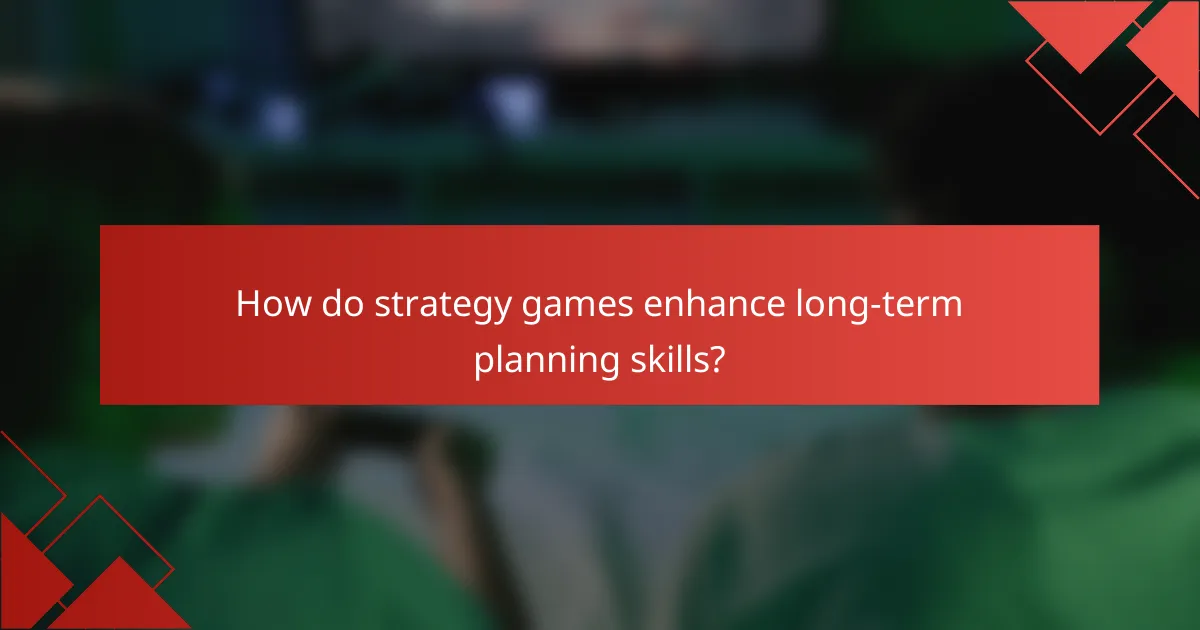
How do strategy games enhance long-term planning skills?
Strategy games significantly improve long-term planning skills by requiring players to think several moves ahead and consider the consequences of their actions. Players learn to anticipate challenges and devise adaptive strategies to achieve their goals over time.
Resource management
Effective resource management is crucial in strategy games, as players must allocate limited resources wisely to maximize their potential. This involves prioritizing needs, such as building units or upgrading technology, while balancing short-term gains with long-term sustainability.
For example, in a game where players gather resources like gold or wood, deciding whether to invest in immediate defense or future expansion can determine success. Players should regularly assess their resource stock and adjust their strategies accordingly to avoid shortages.
Scenario analysis
Scenario analysis in strategy games involves evaluating potential outcomes based on different actions and strategies. Players must consider various factors, such as opponent behavior and environmental conditions, to make informed decisions that align with their long-term objectives.
Utilizing a SWOT analysis (Strengths, Weaknesses, Opportunities, Threats) can help players identify the best course of action. For instance, if an opponent is gaining strength, a player might choose to fortify defenses while planning a counterattack for later.
Future forecasting
Future forecasting is essential in strategy games, as players must predict how current decisions will affect future gameplay. This requires an understanding of game mechanics and the ability to foresee potential shifts in the game landscape.
Players can enhance their forecasting skills by keeping track of trends and patterns in gameplay. For example, if a player notices that opponents frequently invest in offense, they might adjust their strategy to focus on defense and countermeasures, preparing for future confrontations.
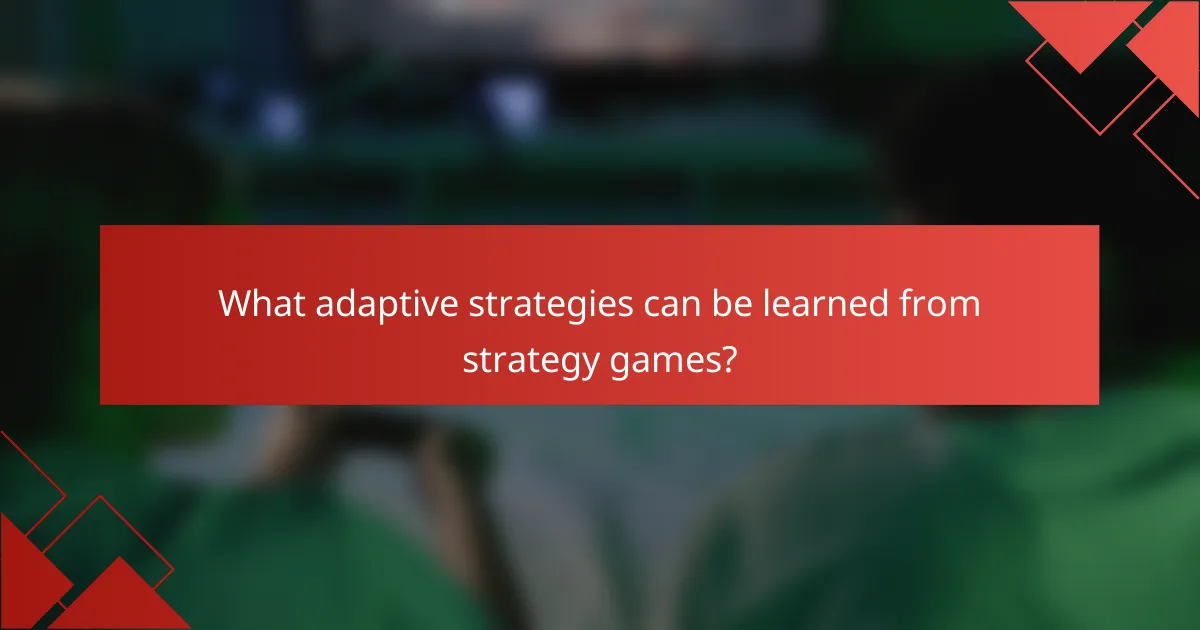
What adaptive strategies can be learned from strategy games?
Strategy games teach players adaptive strategies that enhance critical thinking and long-term planning. These games require players to adjust their approaches based on evolving scenarios, fostering skills that are applicable in real-life decision-making.
Flexibility in tactics
Flexibility in tactics is crucial for success in strategy games. Players often face unforeseen challenges that require them to pivot their strategies quickly. For example, if an opponent unexpectedly changes their approach, a player must be ready to alter their own tactics to maintain an advantage.
To cultivate flexibility, players should practice regularly adjusting their plans based on the current game state. This might involve shifting resources or changing unit formations to respond to threats. A good rule of thumb is to always have a backup plan ready for different scenarios.
Counter-strategy development
Counter-strategy development involves anticipating and neutralizing an opponent’s moves. In strategy games, players learn to analyze their opponents’ strategies and devise effective counters. This can include identifying weaknesses in an enemy’s formation or exploiting resource shortages.
To enhance counter-strategy skills, players should study common tactics used by opponents and develop specific responses. Keeping a mental or written list of effective counters can streamline this process. Regularly reviewing past games can also provide insights into successful counter-strategies.
Dynamic decision-making
Dynamic decision-making is the ability to make quick, informed choices in response to changing circumstances. In strategy games, players must evaluate multiple factors, such as resource availability and opponent actions, to make timely decisions that affect the game’s outcome.
To improve dynamic decision-making, players should practice scenarios that require rapid assessments and choices. Setting time limits for decisions during practice can simulate the pressure of real gameplay. Additionally, reflecting on decisions made during games can help identify patterns and improve future performance.
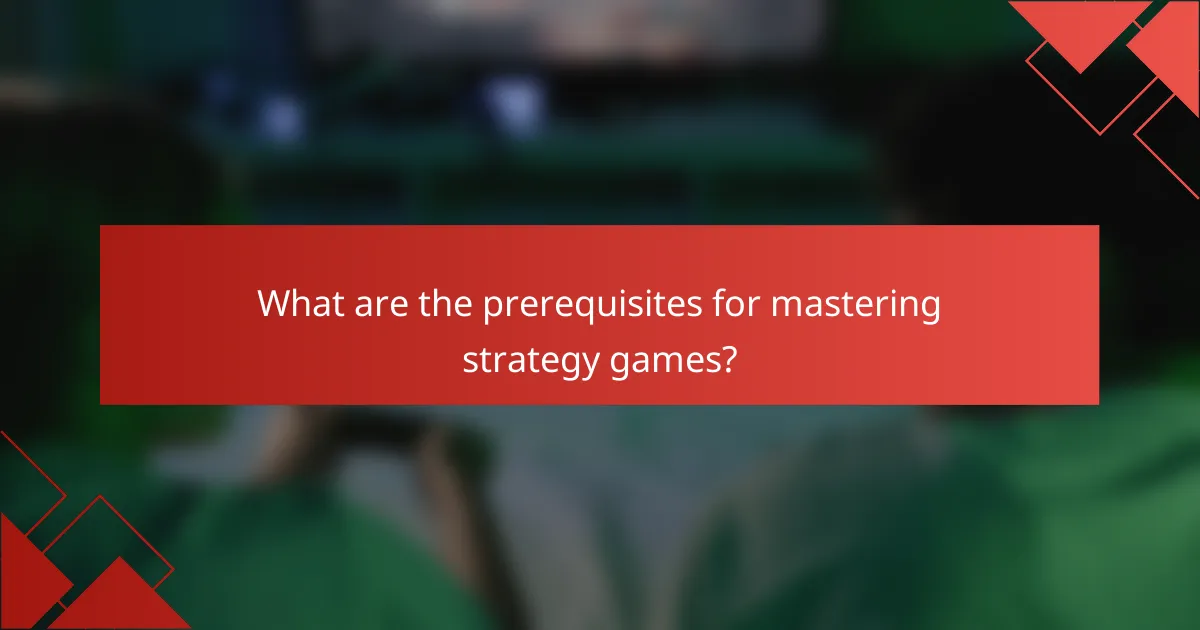
What are the prerequisites for mastering strategy games?
Mastering strategy games requires a combination of understanding game mechanics, gaining practice and experience, and developing analytical thinking skills. These elements work together to enhance critical thinking, long-term planning, and adaptive strategies essential for success.
Understanding game mechanics
Familiarity with game mechanics is crucial for effective strategy formulation. This includes knowing the rules, objectives, and available resources within the game. For instance, in a turn-based strategy game, understanding unit strengths and weaknesses can significantly influence your tactical decisions.
Players should also recognize how different mechanics interact. For example, resource management may dictate the pace of development, while combat mechanics can affect territorial control. A clear grasp of these interactions can lead to more informed choices during gameplay.
Practice and experience
Regular practice is essential for honing skills in strategy games. Engaging in various scenarios allows players to experiment with different strategies and learn from successes and failures. Playing against diverse opponents can also expose players to new tactics and approaches.
Experience helps in recognizing patterns and predicting opponents’ moves. Players should aim to play consistently, dedicating time each week to refine their strategies and improve their decision-making speed. Tracking progress and reflecting on past games can further enhance learning.
Analytical thinking
Analytical thinking is vital for evaluating situations and making strategic decisions. Players should develop the ability to assess risks and rewards, weighing potential outcomes before taking action. This involves not only understanding the current state of the game but also anticipating future developments.
To strengthen analytical skills, players can practice breaking down complex scenarios into manageable parts. Asking questions like “What are my opponent’s likely moves?” or “How can I maximize my resources?” can guide strategic planning. Engaging in discussions with other players or studying expert gameplay can also provide valuable insights.
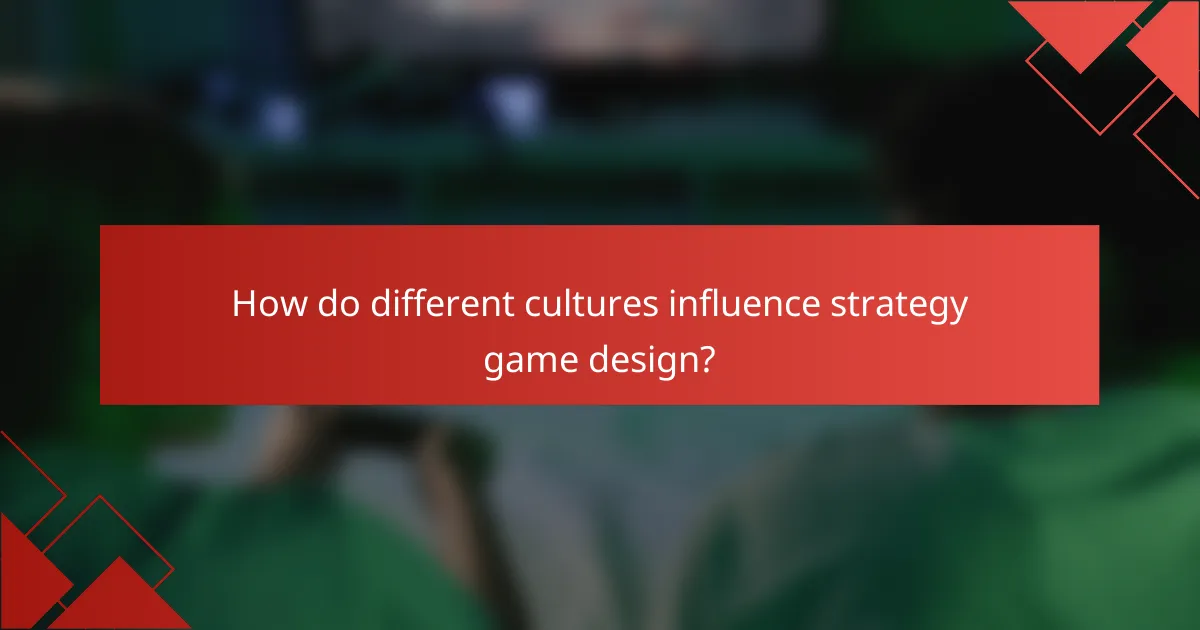
How do different cultures influence strategy game design?
Different cultures significantly shape strategy game design by incorporating unique historical narratives, gameplay mechanics, and thematic elements that reflect their values and traditions. This cultural influence can lead to diverse gaming experiences that resonate with players from various backgrounds.
Historical context
Historical context plays a crucial role in strategy game design, as it often dictates the setting and storyline. Games may draw inspiration from significant events, such as wars or political movements, which can enhance immersion and engagement. For example, games set in ancient civilizations like Rome or China often incorporate real historical figures and battles, allowing players to experience pivotal moments in history.
Moreover, understanding the historical context of a culture can help designers create more authentic gameplay mechanics. For instance, a game based on feudal Japan might emphasize honor and loyalty, influencing how players form alliances and make strategic decisions.
Cultural themes
Cultural themes in strategy games reflect the values, beliefs, and social structures of different societies. These themes can manifest in various ways, such as the portrayal of leadership styles, resource management, and conflict resolution. For example, a game inspired by Indigenous cultures might focus on communal decision-making and sustainable resource use, contrasting with games that emphasize individualism and competition.
Additionally, cultural themes can affect the aesthetic elements of a game, including art style, music, and narrative tone. Designers should consider how these elements resonate with players from specific cultures, ensuring that the game feels authentic and respectful. Incorporating diverse cultural themes not only enriches the gameplay experience but also broadens the appeal of the game to a global audience.
